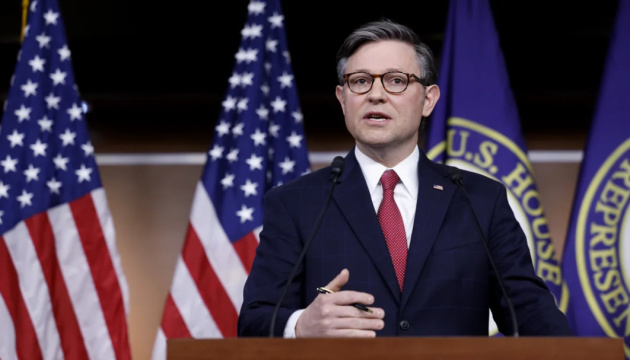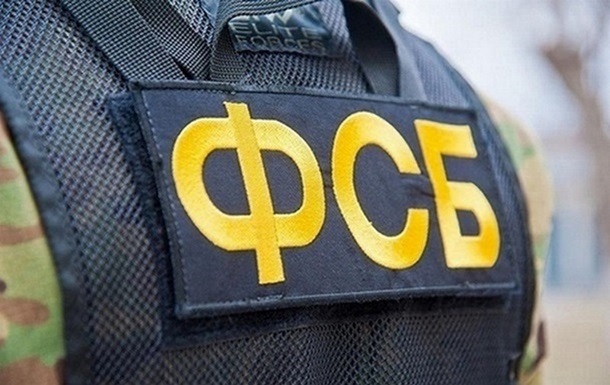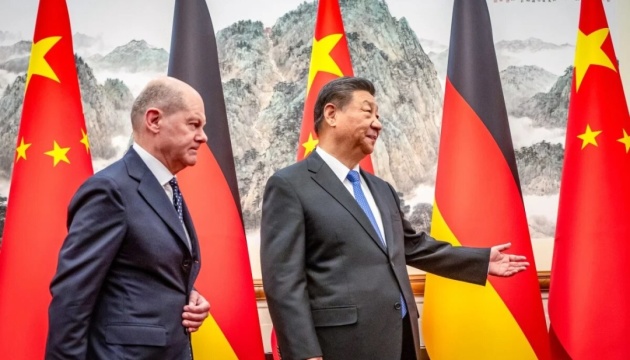
In Beijing, they heard a clear position of Germany and Europe regarding the aggression of the Russian Federation and the continuation of military aid to Ukraine
German Chancellor Olaf Scholz visited China this week for the second time in less than 18 months. The trip was his longest foreign visit within a single country since taking office in December 2021: three days with three stops.
The visit is also the first since Germany adopted its own China strategy last year, in line with the one previously adopted by the European Union, which defines China as a partner, competitor and rival, which of course did not sit well with Beijing.
The chancellor began his visit from Chongqing, a metropolis in southwestern China with a population of more than 32 million, where German business has created a total of 84 companies, most of which work in the automotive industry, Germany's "calling card."
The next day, Scholz was in Shanghai, and ended his trip in Beijing, where his main meetings with the Chinese leader Xi Jinping and the country's prime minister Li Qiang took place.
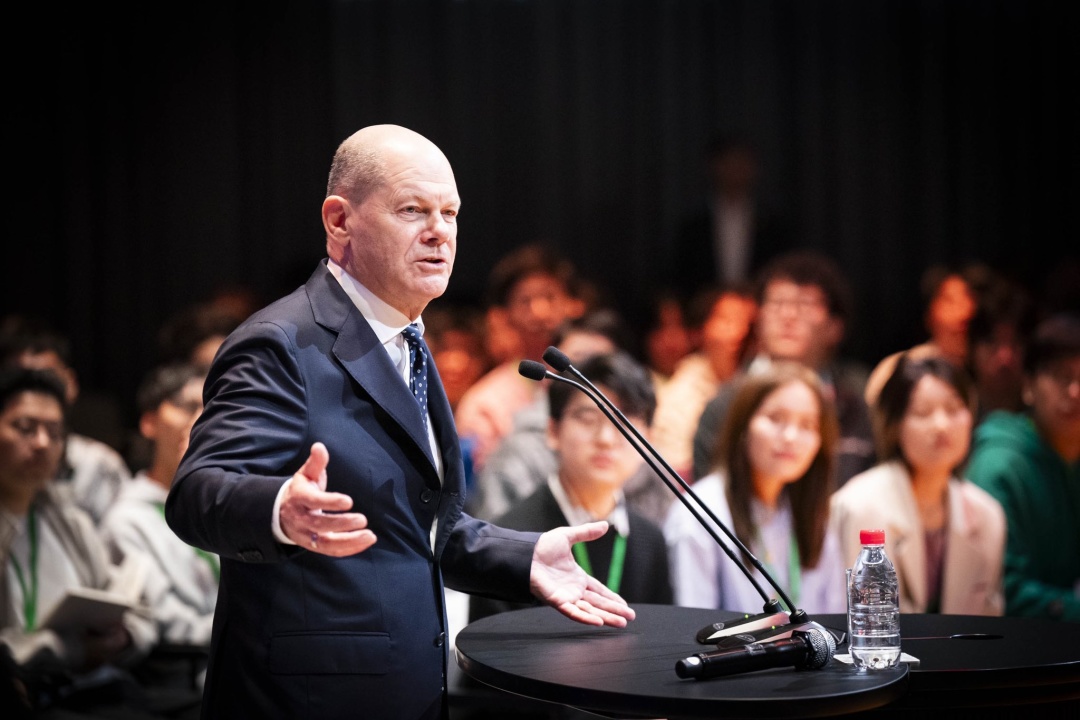 Photo: X/Bundeskanzler
Photo: X/Bundeskanzler
FROM IDYL TO COMPETITION: THE EVOLUTION OF BUSINESS RELATIONS BETWEEN FRANCE AND CHINA
For more than 20 years, China has remained a rapidly and continuously growing market for German industry, adding 10% to 20% to bilateral trade annually. And it was German concerns and corporations that benefited the most, write analysts of Rhodium Group, an independent analytical center specializing in China's economic and political dynamics.
German exports flourished as newly minted Chinese consumers bought their first cars, and factories and plants in the new center of world production needed machines and equipment. The joint ventures created with the participation of Germany helped to train Chinese partners and to realize the economic miracle that made China the second largest economy in the world.
The German economy also benefited from cooperation with China. The presence of a partner with rapidly growing production has significantly eased Germany's passage through several successive economic crises in recent years, and for eight years Beijing has remained Berlin's main trading partner, crossing the threshold of two-way trade of 2023 billion euros in 254,1.
Now there are about five thousand German companies working in China, thanks to which the country has an additional million jobs. However, over the past few years, cracks have begun to appear due to increased internal competition with local manufacturers, who are effectively squeezing the Germans out of their market.
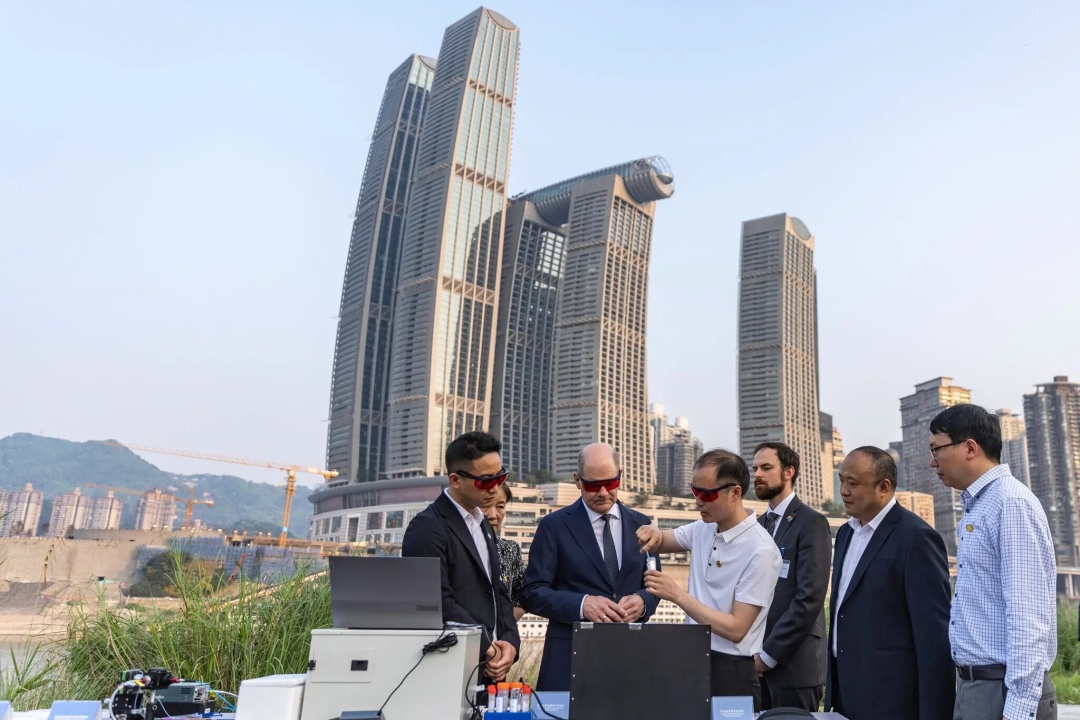 Photo: Huang Wei/Xinhua
Photo: Huang Wei/Xinhua
More and more economists, commenting on the data on the decrease in demand for the products of German companies and the stagnation and drop in their sales, state that the long period of the German-Chinese honeymoon is over. And they predict that now cases of increasingly tough competition with Chinese manufacturers will become the rule rather than the exception in relations.
"Over the past five years, local competition has grown at a frantic pace. The result: 80% of German companies that want to invest in China do so in order to maintain competitiveness," said Maximilian Butek, executive director and board member of the German Chamber of Commerce in China.
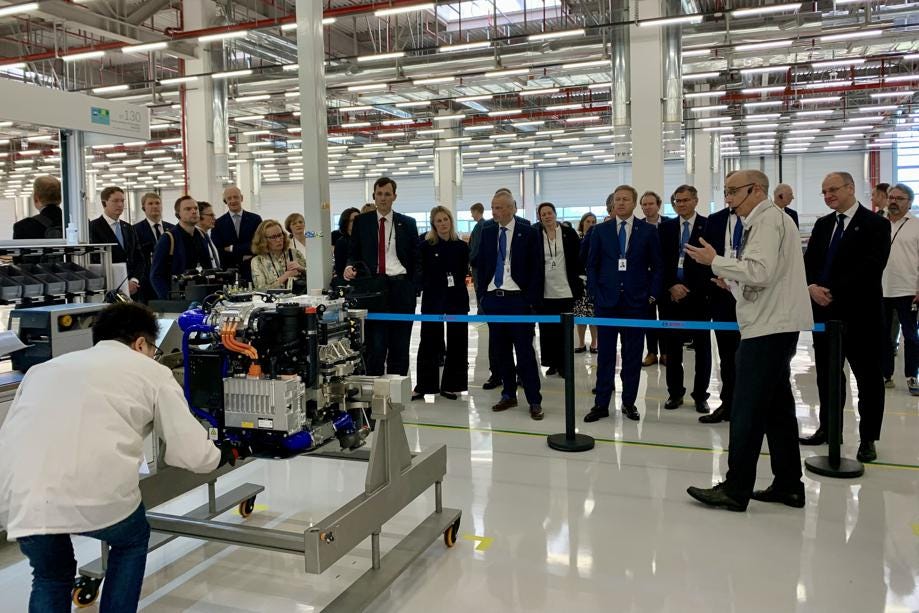 Photo: chinahydrogen.substack.com
Photo: chinahydrogen.substack.com
The desire of German manufacturers, who are used to feeling comfortable in the Chinese market, to maintain their position leads to the fact that they are cutting production and jobs at home and investing in China. For example, the chemical giant BASF last year announced the loss of 2600 jobs in Germany at the same time as it increased investments in China, the engineering giant Bosch this year and last year cut several thousand jobs at home, investing several billion euros in research and production centers in China.
Car manufacturers are not far behind. Shortly before Scholz's trip, Volkswagen announced $2,68 billion. investment in the expansion of production and research facilities in the city of Hefei, Anhui province in southeastern China. Mercedes-Benz and ZF Friedrichshafen have similar plans, although such processes have not yet reached a critical scale.
Cuts in production in the domestic market for expansion in China are no joke alarming German trade unions, who call them unacceptable and fatal signals. Against the background of the slowdown of the German economy and other negative factors, the loss of jobs in key branches of its industry can become extremely painful.
In addition, the issue of excess production capacity in the PRC, overproduction, which is already creating challenges for foreign manufacturers, including European ones, is becoming increasingly acute. In particular, we are talking about Chinese electric cars and "green" energy equipment, which are supplied in large volumes to the European market at significantly lower prices and can bury competitors, depriving them of buyers.
The European Commission is already investigating electric cars and initiating inspections of new energy generation products, angering Beijing. And this is probably just the beginning.
PRAGMATIC SCHOLTZ
Under such conditions, the Chancellor of Germany seeks to maintain economic relations with China and at the same time reduce dependence on it in critical sectors, which was fully demonstrated during the visit. In particular, Scholz was accompanied by a large business delegation, which included, among others, heads of Siemens, Bayer, Mercedes-Benz, BMW, and Merck Group.
On the eve of the visit and during the trip to China, the chancellor emphasized the economic component of relations with the PRC, called for fair competition, fair treatment of German companies in China, and emphasized that his country does not seek separation from the Chinese market. On the most controversial issue of Chinese electric cars, Scholz was more likely to side with the Chinese, saying that the European market should be open to Chinese cars on the condition of fair competition.
Commenting on the situation with Chinese cars in Europe, he recalled that when Japanese and South Korean cars entered the European market, there were also fears of losing the market to manufacturers from the EU.
"Nonsense. Now Germany has Japanese cars and Japan has German cars, and the same goes for China and Germany,” the chancellor said, adding that at some point Germany and Europe will also have Chinese cars, but they have to compete on an equal footing.
"The only thing that should always be clear is that the competition should be fair. In other words, that there is no dumping, that there is no overproduction, that copyrights are not violated," Scholz emphasized.
The chancellor made similar statements pleasing to the Chinese leadership during the negotiations with Xi and the prime minister of the government.
"Germany is ready to strengthen communication and coordination with China to jointly respond to global challenges such as climate change, protect the multilateral international order, promote global peace and development, and does not approve of confrontation," he told the Chinese leader.
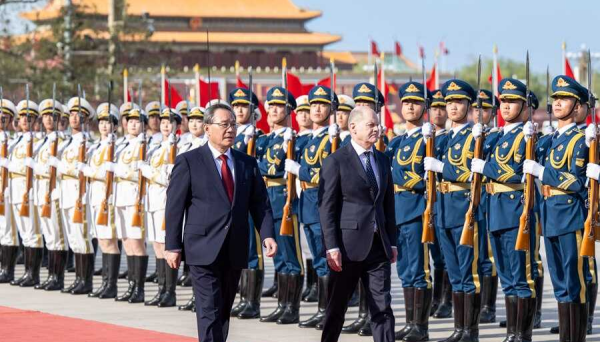 Photo: Ministry of Foreign Affairs of China
Photo: Ministry of Foreign Affairs of China
And at the meeting with Li Qiang, Scholz assured that Germany opposes separation from China and trade protectionism and is ready to cooperate with China to create a fair competitive environment and expand bilateral cooperation."
Chinese leaders also demonstrated a pragmatic and constructive approach. In particular, Xi said that there is no fundamental conflict of interest between China and Germany, and the prime minister assured the chancellor that the advantages of China's new energy industry are achieved as a result of development progress and are formed through market competition, not thanks to government subsidies.
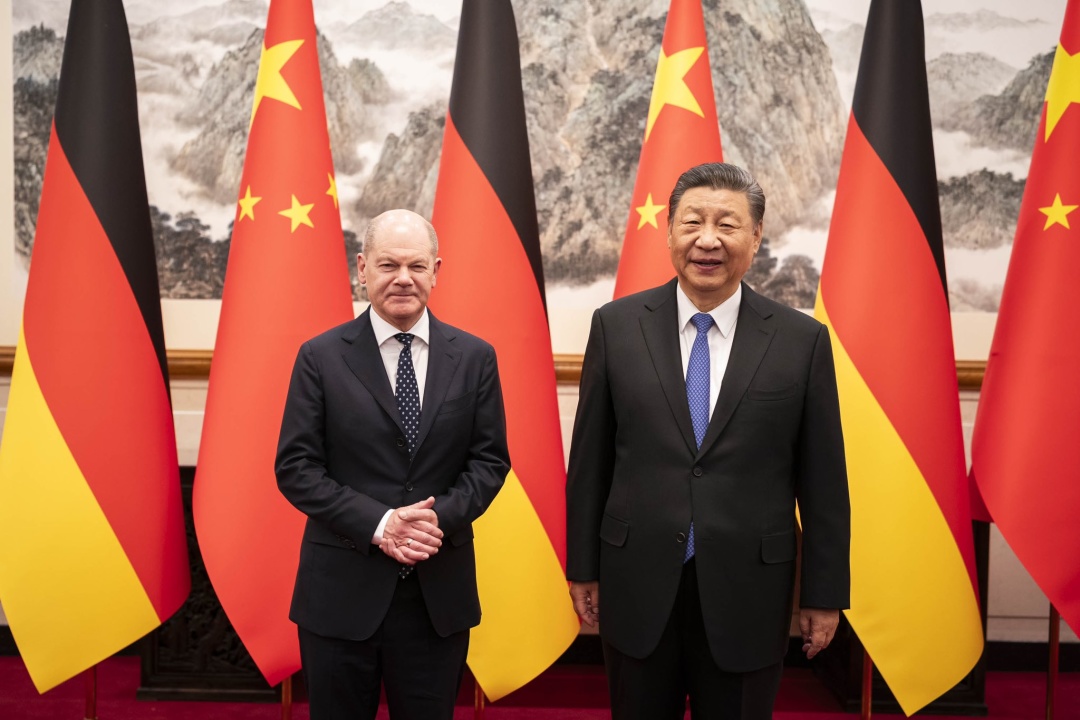 Photo: X/Bundeskanzler
Photo: X/Bundeskanzler
China's leaders only complained that Europe does not fully understand the specifics and peculiarities of the organization of production in their country and initiates investigations and inspections of "honest" Chinese business. Therefore, Beijing hopes for Berlin's support and that the European Union will adhere to market principles, fair approaches and judicious use of trade protection measures.
During Scholz's visit, German and Chinese companies concluded several agreements and declarations, but this component is not emphasized. The statements of the chancellor and his Chinese counterpart attracted the most attention, the evaluations of which differ depending on the commentator.
In particular, the Chinese media in one voice, probably adjusted in the government offices, claim that the visit is very successful. "China and Germany are sending a strong signal of mutually beneficial cooperation to stabilize the world," all Chinese state media came out with similar headlines, which extremely positively evaluated the statements and signals of the German chancellor.
Instead, the tone of the European media and especially the comments of analysts are completely opposite, some are even quite harsh. Scholz was accused of retreating from a single European course towards China and lobbying exclusively for the national interest.
"I must say that it is a disaster... There was no European dimension in the preparation or in the results of the visit, and this demonstrates how much Scholz played nationally and how non-European he was," commented the head of the foreign relations program of the authoritative German center "Institute" on the trip for China Studies Mercator" by Abigail Vasselieu.
In her opinion, during the visit to China, the Chancellor of Germany acted as if what is happening in Brussels is a completely different universe. And such assessments generally prevail in the European expert environment.
UKRAINE AND RUSSIAN AGGRESSION
The issue of the Russian invasion of Ukraine was taken out by Scholz into a separate large block. Even on the eve of the trip and immediately before the meeting with the leaders of China, he noted that he would discuss the Russian war against Ukraine with the leadership of the People's Republic of China and emphasize the inadmissibility of supporting the aggressor state.
"I will speak about this war that Russia is waging against Ukraine, which is a war of aggression, and I will insist that no one helps it happen," the chancellor said.
And he kept his promise. It should be noted that the issue of the Russian-Ukrainian war is very unpleasant for the Chinese leadership. In Beijing, they try to avoid it at all costs, especially when it comes to negotiations with the country's leader, the topics of which are carefully agreed long before the meeting.
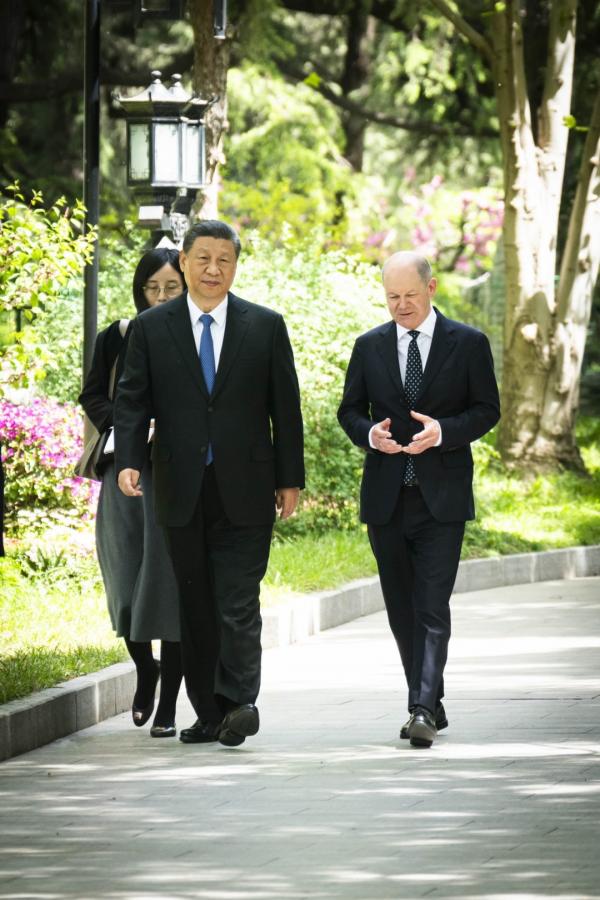 Photo: X/Bundeskanzler
Photo: X/Bundeskanzler
However, during the negotiations with Scholz, it seems that Xi was forced to pay no less attention to the unpleasant topic of the war than to bilateral trade and the economy, which can already be considered an important achievement for Ukraine. The Chinese side even prepared a separate press release on the Ukrainian issue, which is also significant, even despite its content.
China's leaders, who declare neutrality regarding the war, communicate intensively with Moscow, but further avoid contacts with Kyiv. Therefore, in such a situation, the help of partners who remind Beijing about the aggressive nature of the Russian invasion of Ukraine and the unacceptability of the Russian Federation's support is extremely important. Such support was duly appreciated in Kyiv. President Volodymyr Zelenskyi separately thanked Sholts for his efforts and international communication - for the signals he heard from Beijing.
The statements of the Chinese leader did not create a sensation. In them, he, like the entire authority vertical subordinated to him before, said that the People's Republic of China had no interest in the war and the need to stop hostilities as soon as possible.
"China is not a party or a participant in the "Ukrainian crisis", but it is promoting peace negotiations in its own way. China encourages and supports all efforts that contribute to the peaceful resolution of the "crisis", Xi said.
And he also repeated that China supports an international peace conference regarding Ukraine, but with the participation of Russia and with a fair discussion of all peace options. However, the Chinese side has never explained its vision of the positions on which Ukraine can now reach an understanding with Russia, having mutually exclusive positions.
The Chancellor of Germany spoke more specifically. Summing up the negotiations in Beijing, he said that Berlin intends to continue providing Ukraine with military aid and at the same time intensify diplomatic efforts to end the war.
"It is important for Germany, as well as for many friends of Ukraine, to make it clear that we will support Ukraine as intensively and for as long as it is necessary, and at the same time we will contribute to the diplomatic efforts that Ukraine is also taking care of very intensively," Scholz said. .
Obviously, he said the same thing to the leaders of China, and this is a powerful signal from the EU leader country, which was definitely heard and recorded in Beijing. The chancellor also reported that during the visit, signals were received that indicate broad support and understanding of the need to continue the meetings regarding peace in Ukraine, which were started in Copenhagen, Jeddah, Valletta and Davos.
And although China's "understanding" may be its own, as well as the promotion of peace talks, it is also an undeniable positive for Ukrainians. Xi's visit to France is scheduled for early May, and there is no doubt that Emmanuel Macron will repeat Scholz's words about supporting Ukraine and the unjust Russian invasion, and perhaps he will speak more harshly.
At present, it is difficult to predict whether the leaders of powerful European states will be able to influence Xi's approach to war, but this must be done together with the introduction of sanctions. After all, over two years of war, China has demonstrated more than once that its own interests are an unconditional priority and that the "boundless" strategic partnership with Russia actually has borders, or red lines, the approach to which demonstrates the real importance of Russian ties for Beijing.
Vladimir Sidorenko, Beijing
First photo: DPA


 1025
1025





